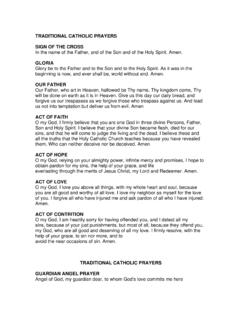Transcription of The Rule of Saint Benedict - Solesmes
1 The Rule of St. Benedict 1 The Rule of Saint Benedict (Translated into English. A Pax Book, preface by Lowther Clarke. London: , 1931)PROLOGUEH earken continually within thine heart, O son, giving attentive ear to the precepts of thymaster. Understand with willing mind and effectually fulfil thy holy father s admonition; that thoumayest return, by the labour of obedience, to Him from Whom, by the idleness of disobedience,thou hadst withdrawn. To this end I now address a word of exhortation to thee, whosoever thou art,who, renouncing thine own will and taking up the bright and all-conquering weapons of obedience,dost enter upon the service of thy true king, Christ the the first place, then, when thou dost begin any good thing that is to be done, with mostinsistent prayer beg that it may be carried through by Him to its conclusion; so that He Who alreadydeigns to count us among the number of His children may not at any time be made aggrieved byevil acts on our part.
2 For in such wise is obedience due to Him, on every occasion, by reason of thegood He works in us; so that not only may He never, as an irate father, disinherit us His children,but also may never, as a dread-inspiring master made angry by our misdeeds, deliver us over toperpetual punishment as most wicked slaves who would not follow Him to us therefore now at length rise up as the Scripture incites us when it says: Now is thehour for us to arise from sleep. And with our eyes open to the divine light, let us with astonishedears listen to the admonition of god s voice daily crying out and saying: Today if ye will hear Hisvoice, harden not your hearts. And again: He who has the hearing ear, let him hear what the Spiritannounces to the churches.
3 And what does the Spirit say? Come, children, listen to me: I willteach you the fear of the Lord. Run while ye have the light of life, that the shades of death envelopyou not. And inquiring for His own labourer among the multitude of the people to whom Heproclaims these things, the Lord says again: Who is the man that wishes for life, and desires to seegood days? And if hearing this thou dost answer I, God then says to thee: If thou dost wish forlife true and eternal, refrain thy tongue from evil and let not thy lips speak guile. Turn aside fromevil and do good; seek out peace and follow it. And when ye have done this, lo, My eyes are uponyou and My ears open to your prayers. And before ye call, I will say, Behold, I am here.
4 What, most dear brethren, could be more sweet to us than this voice of the Lord inviting us?Behold the Lord points out the way of life to us by His own fatherly our loins then be girt with faith and the observance of good works, and let us, gospel-led, pursue His paths, that we may be worthy to see Him Who has called us unto His own if our wish be to have a dwelling-place in His kingdom , let us remember it can by nomeans be attained unless one run thither by good deeds. For, with the prophet, let us ask the Lord,saying to Him: Lord, who will dwell in Thy tabernacle, and who will rest in Thy holy mount? After putting this question, brethren, let us listen to our Lord showing us in answer the way to thatsame tabernacle by saying: He who lives blamelessly and does justice; he who speaks truth fromhis heart; he who has kept his tongue from guile; he who has done his neighbour no evil and hasaccepted no slander against his neighbour : he who has brought to naught the malignant slandererthe devil, rejecting from his heart s thoughts him and his efforts to persuade him; and who has takenThe Rule of St.
5 Benedict 2hold of his suggestions or ever they be come to maturity and has dashed them against the Rockwhich is Christ. Those who fear the Lord are not puffed up by their own good observance of rule,but reckoning that the good that is in them could not be wrought by themselves but by God,magnify the Lord working in them and say with the prophet: Not unto us, O Lord, not unto us, butto Thy Name give glory. Just as also the Apostle Paul attributed nothing to himself concerning hisown preaching, but said: By the grace of god , I am what I am. And again the same Paul said: Hewho glories, in the Lord let him glory. Whence the Lord also says in the Gospel: He who hears these My words and does them, Iwill liken him to a wise man who built his house upon a rock.
6 There came torrents of rain andrushing winds, and they struck upon that house, but it fell not: for it was founded upon a rock. As aconsequence our Lord daily looks for it that we should respond by deeds to these His holywarnings. Thus it is on account of the need of correcting faults that the days of this life areprolonged for us, as by way of truce; and the Apostle says: Art thou ignorant that the patience ofGod leads thee towards penitence? For the Lord in His tenderness says: I will not the death of asinner, but that he may be converted and live. Since therefore, brethren, we asked of the Lord concerning the dweller in His tabernacle, wehave heard, as a precept concerning dwelling there, if we fulfil what is required of a dweller there.
7 Therefore must our hearts and bodies be prepared as about to serve like soldiers under holyobedience to these precepts; and whatsoever our nature does not make possible let us ask the Lordto direct that the help of His grace shall supply. And if we wish to escape the pains of hell and attainto eternal life we must hasten to do such things only as may profit us for eternity, now, while thereis time for this and we are in this body and there is time to fulfil all these precepts by means of have therefore to establish a school of the Lord s service, in the institution of which wehope we are going to establish nothing harsh, nothing burdensome. But if, prompted by the desire toattain to equity, anything be set forth somewhat strictly for the correction of vice or the preservationof charity, do not therefore in fear and terror flee back from the way of salvation of which thebeginning cannot but be a narrow entrance.
8 For it is by progressing in the life of conversion andfaith that, with heart enlarged and in ineffable sweetness of love, one runs in the way of god scommandments, so that never deserting His discipleship but persevering until death in His doctrinewithin the monastery, we may partake by patience in the suffering of Christ and become worthyinheritors of His kingdom . I: CONCERNING THE DIFFERENT KINDS OF MONKSIt is clear that there are four kinds of monks. The first is that of the C nobites, that is themonastic kind, who serve under a rule and an the second kind is that of the Anchorites, that is the Eremites; and these are they whoare not any longer in the novice-like fervour of the life of conversion, but by the daily discipline ofthe monastery have learnt to fight against the devil and are thoroughly experienced in the solace thatbeing one of many affords.
9 And who, as being well established for the lonely battle of the desert,beyond the fighting line of their brethren and already brave apart from the consolation ofcompanionship, are competent to fight single-handed, God helping them, against the vices of fleshand mind. And the third kind of monks is that very disgraceful kind of the Sarabites, who have notbeen brought under discipline by any rule dictated by experience so as to become as gold refined bythe heat of the furnace, but who, as soft as lead, while still by their works keeping faith with theworld, are known by their tonsure to be lying to God. These are they who being by twos or threes,or indeed singly and without a pastor, enclosed not in the Lord s but in their own sheepfolds, takefor law their own whims, since whatever they think and choose they say is holy and whatever theyThe Rule of St.
10 Benedict 3dislike they esteem unlawful. And the fourth kind is that of the monks called Girovagi, who are alltheir lives guests for three or four days at a time in the different groups of cells through the variousprovinces. Always wanderers and never settled, they are slaves to their own pleasures and the snaresof gluttony and in every respect worse than the Sarabites. Concerning the most miserable manner oflife of all these, it is better to be silent than to speak. Leaving these out of our calculations therefore,let us come to arranging by the Lord s help for this most stable kind, the C II: WHAT KIND OF MAN AN ABBOT OUGHT TO BEAn abbot who is worthy to preside over a monastery ought always to remember what he iscalled and to justify his title by his deeds.


